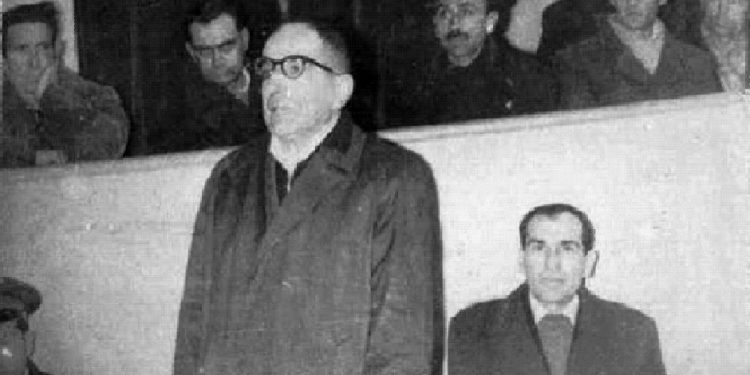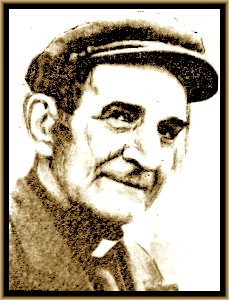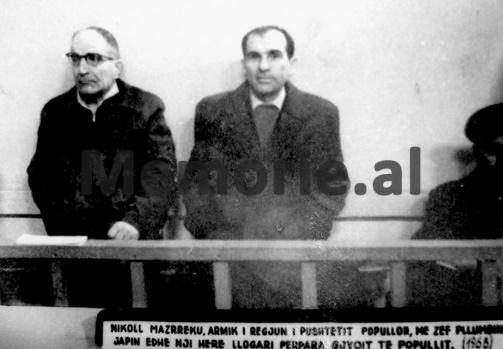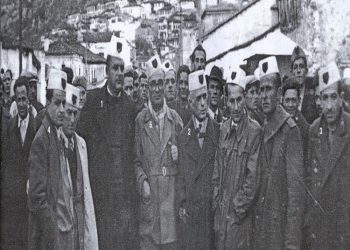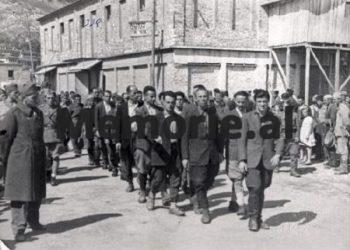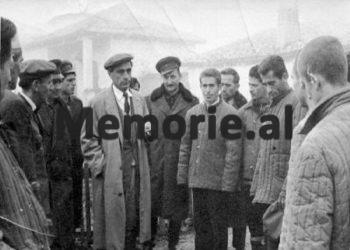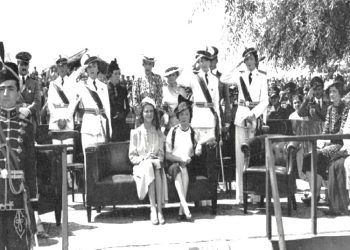
By Agim Leka
Memorie.al publishes the unknown story of the publication of the book “Cordinjano Scandal and the Defense of the Albanian Nation”, by Dom Nikoll Mazrreku, published in 1941, in response and opposition to the Italian priest, Fulvio Cordinjano, author of a book of attacks malicious and baseless accusations against the Albanian nation. Translation of that book by the 17-year-old student of the Tirana Gymnasium, Agim Leka, (originating from a family known for the patriotic traditions of the Borsh of Saranda), with the new title “Risposta a Cordignano sui suoi giudizi nei riguardi degli Albanesi”, which means “Cordinjanos’ response to his judgments of the Albanians”.
Like many other historical cities of Albania, Shkodra has been for centuries a shining of knowledge and a fortress of pride for wisdom and bravery in defense of Albanian honor, traditions and independence. Moreover, Shkodra embodies the historical connection of the Albanian people with the Western World as a shield of its civilization. Therefore, it was not unexpected that during the rule of fascist Italy, when the poisonous feather of the Italian priest, Fulvio Cordinjano, attacked the nucleus of Albanian existence in the infamous temporary “Rivista d ‘Albania” of March 1941, the strict answer came out of this historic city, from Shkodra and Teuta, with two books which represent the beginning of the open resistance by the Albanian pen against the fascist Italian rule.
Nikoll Mazrreku’s two books The book “Cordinjano Scandal and the Protection of the Albanian Nation” by Nikë Barcolla, (nickname of Dom Nikolë Mazrreku), consisting of 36 pages and signed by 20 professors of Shkodra State High School, Cordinjano in Court before the World “, Consisting of 31 pages, inspired the youth of Tirana and other cities of Albania to hold demonstrations against fascist Italy. In those two books against Cordignano, the tone of Dom Nicole Mazrreku’s response, in addition to the conditional title, is reflected on the cover of his book where 12 arrows were drawn and where a quote from a proverb of Aristotle was written: “Do not be angry when it begs, it is taken ”.
Thus, Dom Mazrreku, coordinating the Albanian bravery and wisdom, openly exploded the contempt of the Albanians against Cordinjano and consequently against those who had incited him to write against our people, in order to justify the occupation of Albania, as a mission and civilization of Fascist Italy, as you become in the time of the Roman Empire. Also in Cordinho’s book, Albanians were presented as the most backward and obscurantist Nation in Europe and the arrival of the Italians in Albania was considered not as an invasion, but to civilize them. The book was seized by order of the Italian Luogotenence and the Albanian priest Dom Nikolë Mazrreku, who at that time was an assistant parish priest in the Parish of Tirana, was interned in secret and without fuss in the villages of Malësia.
Borshi and my family Leka
At a time when most of my friends in the State Lyceum of Tirana, with their undeniable idealism for the liberation of our homeland and for the construction of a “new society”, had embraced a foreign ideology which said: “International will be the new world “, I began to add my doubts reinforced by my father, who said to me:” Nothing good will come to our nation from the Slavo-communist world “. My father told me about the suffering caused by our northern and southern neighbors, which he had experienced with sorrow in his heart, how our village Borshi, known in the Middle Ages as “Sopot”, together with 314 Albanian villages were turned to ashes by the Greek andartes in 1914, only that their inhabitants were Albanians generation after generation since ancient times.
In the fortress of Sopot (Borsh), built in the fourth century BC, where the son of Skanderbeg, John Kastrioti, after landing with his contingent in Himara in 1481, made the strongest resistance aided by the brave of the coast of Himara and all of Labëria, who recognized Gjon Kastriot as their prince. Eighteen years later, in 1499, Gjergj Kastrioti, his son, landed again with another contingent and concentrated his resistance in Sopot. In the summer of 1572, when in Western Europe, religious fanatics committed the most ugly fratricide, in the castle of Sopot (Borsh), Albanians showed the world how to honor Western civilization.
In their heroic struggle for freedom, the warriors of Sopot Castle were blown up along with their gunpowder depots and 500 Ottoman soldiers who had infiltrated their fortress. (Contarini G.P. histoire page 30). Throughout its medieval history, Borshi has felt the heavy weight of the two sultans, who saw it necessary to lead their troops to subdue the rebellious population of the Albanian coast, the first, Sultan Bayezid II in 1492 and the second, Sultan Sulejmani in 1537. This is how the folk song sings the heroism of the Albanians for freedom: “This sultan cries with tears, there is also a Skënder in Sopot”.
How did Mazrrek’s book affect me?
Within the context described above, the publication of Mazrreku’s book “The Cordinjano Scandal and the Defense of the Albanian Nation” was for me the inspirational spark in reviving my National feelings and reinforcing my conviction that I should continue the tradition of my nationalist family. which had started with my grandfather Nebi Sefa, the signer of the declaration of Albanian independence in 1912 in Vlora and one of the main protagonists in the organization of the Congress of Lushnja in 1920. It was Nebi Sefa who was tasked by the preparatory commission of the Lushnja Congress to seek the cooperation of Luigj Gurakuqi, whom he had met in Vlora on November 28, 1912.
Likewise, the tradition of my family continues with my grandfather Ibrahim Leka, who as the commander of the Lushnja Region, annulled the telegraphic order sent by the Governor of Ioannina, where he ordered the arrest of Ismail Qemali and the other delegates who accompanied him to Vlora. Ibrahim Leka informed Nebi Sefa that he would leave an open road for the Albanian delegation, which would pass unhindered to Vlora under his silent protection and wished Ismail Qemali success. (Documents, Institute of History, The File of Qemal Karaosmani, 1936).
The contribution of the Leka family to the declaration of independence
Like many other patriotic families, the Leka family has made a modest contribution to the proclamation of Albania’s independence. Thus Hamit Leka, Governor of Tirana, by order of Ismail Qemali, together with the leadership of Tirana, on November 26, 1912, at three-thirty in the afternoon raised the flag in Tirana and sent a telegram to Hifzi Pasha, the commander of the Turkish troops in the Balkans, where he announced that Tirana was already Albanian territory (book: “Patriotism in Tirana”).
The tradition of my family continues with my father Rakip Lekë, who dedicated his life to the Albanian Jurisprudence, serving the people with all his possibilities as a lawyer. As a law student at Istanbul University, Rakip Leka was second on the list of Albanian students who signed the protest sent to the Sultan against the Arabic alphabet and in favor of the Latin alphabet for the Albanian language.
How did I translate Mazrrek’s book?
Extremely enthusiastic about Dom Nikoll Mazrreku’s book, I decided to translate it into Italian and for this I requested a meeting with Dom Nikoll, in order to get permission for the publication of the book. I met Dom Nikolla at the beginning of 1942 in Tirana, where he served as a parish priest. That meeting was a great and very sad for me, because I, an 18-year-old student completely unknown, was meeting a great personality and patriot, who with his book against Cordinjano had raised the values of the Albanian race. I remember as now that moment when in front of me appeared that tall man, dressed in simple religious clothes, who with his pen had encouraged hundreds of Albanian students to demonstrate for freedom.
His sweet word and his idealism for our oppressed homeland, were the whole topic of our conversation. At once we understood what was the duty of every Albanian citizen, whatever the consequences of the fascist occupier. None of us wanted fame or any material gain, it was just a task that stemmed from the spirit of our Albanian gene which required selflessness. After Dom Nikolla, with the greatest pleasure, gave me permission to publish the book, in his preface to Italian readers in 1942, I wrote: “The translation of this book into Italian had no other driving force than simple love for the Homeland. “. This meeting was the first and last with Dom Nikolla, because persecuted by the Italian fascist authorities, he was silently forced to leave Tirana and go to the remote villages of Malësia.
The vicissitudes of book publishing
Even today I do not know how I decided at the age of 18 to spend four months translating and publishing the book “The Cordignano Scandal and the Protection of the Albanian Nation”, giving it the new title “Risposta a Cordignano sui suoi giudizi nei riguardi degli Albanesi ”, which means“ Cordinjano’s response to his judgments on Albanians ”. By not changing any words within the original text, I was able to obtain permission for its publication in Italian, a book which had previously been seized in the Albanian edition.
The book was published by the printing house “Kastrioti” with a circulation of 2000 copies and was distributed being bought by various consulates of Italians who were in Albania. Why I chose the book of Dom Nikoll Mazrreku (Nikë Barxolla) for translation and why I decided to enrich it with notes taken from the publication of Shkodra High School professors “Cordinjano in court before the World”, thus increasing the translation of the book into language Italian from 36 pages in the Albanian original, to 42 pages of the Italian translation, is not the place to stop in these few lines, because I explained them in my translation preface, which was published on May 5, 1942.
I started this preface with Fishta’s verses translated into Italian, which reflect the Albanian pride through the centuries and the challenge of the Albanian race and spirit, where it is said: “We are the sons of a tribe mentioned / in hand, qi shines like the steel confession / qi of tranquility except for the enemy to tremble / that our world honors towards faith ”.
Last meeting with Dom Mazrreku
In October 1994, with a colleague, I sent my warmest greetings to Dom Nikolle Mazrreku. He replied with a picture of him as a memento, in which he wrote: “Greetings with much longing.” So 52 years after our brief meeting in the parish of Tirana in 1942, Dom Nikolë Mazrreku from the capital of Illyria and I Agim Leka from New York, but originating from the village of Borsh, the pearl of the Albanian Riviera at the southern tip of Albania that truncated, we were reunited spiritually, with a burning heart for the long-suffering Nation, just as we reunited half a century ago.
Shortly before, I received the news that Dom Nikolla had parted from this life. His soul is now in the eternal world. He dedicates his whole life to the God of the Homeland and we, the generations of Albanian youth, whom he inspired with the high ideals of humanity and with love and sacrifice for our dear Homeland, will always remember with the greatest respect./Memorie.al







